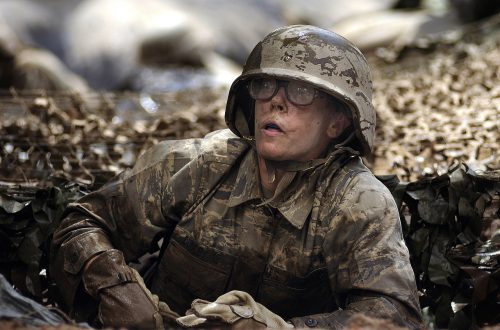 The controversy over Sheri Klouda spilled over onto television sets across the metroplex last night as the ABC affiliate in Dallas did a feature on Klouda’s departure from Southwestern Seminary. You can watch the video by clicking here.
The controversy over Sheri Klouda spilled over onto television sets across the metroplex last night as the ABC affiliate in Dallas did a feature on Klouda’s departure from Southwestern Seminary. You can watch the video by clicking here.
In my view, the feature was not even-handed. Perhaps this wasn’t the intention, but it portrayed the seminary as repressive for trying to apply 1 Timothy 2:12 (not 1 Timothy 2:11!) to its hiring of Bible professors. I don’t know how one could escape the conclusion that the Bible was somehow to blame for the whole ordeal.
Klouda’s story goes to show that the gender issue will not be going away any time soon. Not only do Christians continue to disagree over the proper interpretation of key texts, but they also disagree over how to apply the texts in various church and para-church settings. The ironic thing about the Klouda controversy is that so-called “complementarians” can be found on both sides of this issue.
Klouda has relocated, and her particular case will eventually fade from view. But the conversation on gender roles in the church and in the home is far from over.
See my previous post: “Klouda Controversy in the Star-Telegram”
See my previous posts on gender roles: Click Here




20 Comments
barry
So what was Dr. Merrill saying? That the problem was their policy made long ago?
Peter G.
I still don’t really understand what happened here. Did Southwestern officially change it’s stance on women professors? Does the school have an official policy on the matter?
No doubt Christian’s will continue to disagree about the gender issue. But when will we learn to disagree with grace? Can we not discuss the issue with kindness? I can understand when Evangelical complementarians (of which I am one) react strongly to those who disagree because they disregard the Bible’s authority, but why do we react with the same fervor to those who disagree because they simply have a different interpretation? Can we all admit that non-omniscient humans will never reach complete consensus on various interpretations of the Bible’s teaching?
I fear that too often we accuse those who disagree with us of disregarding the Bible’s authority when all they’ve really done is offered a differing interpretation from ours. Different interpretation does not equal denial of authority.
Denny, I’m curious whether you think 1 Tim. 2:12 should be applied to para-church settings (e.g. seminaries). I know that question has been discussed here at Moody with faculty members falling on both sides. I think the women training here could benefit greatly from having a fellow female in the Bible or theology departments. These are issues I would like to see addressed more thoroughly by complementarians or maybe they have and I’m just not aware.
dennyrburk
Peter,
The Klouda controversy actually raises two issues: (1) the gender-issue, specifically, and (2) our ecclesiology, more generally.
In my view, the reason that so many complementarians favor females teaching bible and theology at seminary is because they have a low ecclesiology. In my view, the seminaries should be run as entities that serve the churches of the SBC. That means that the seminary should not undermine the church’s mission by the policies it adopts.
Thanks,
Denny
celucien joseph
Denny,
Those who are in favor of women teaching theology in seminary do not seem to have a low ecclesiology as you stated. This is quite an inconsistent statement to what complementarians believe about the nature of the church and its function/role. I am an egalitarian and do not believe teaching theology/bible in a seminary setting is limited to men only.
Blessings,
Celucien
Debbie
So, do you feel women should not teach in a mixed class at all?
I feel there are certain things women can teach far better.
BTW, Denny, susie hawkins taught thr lunch talk crowd today.
Paul
Either way, after they decided to hire her, they made a commitment to her as well. She didn’t do anything wrong to justify being fired outside of being the wrong gender.
If she didn’t get a seven figure severence package, I surely hope she sues for enough money to put Southwestern out of business.
Michael Bird
Denny,
I’m not so sure that having a different view of the application of 1 Tim 2 to seminaries means I have a lower view of ecclesiology than yours. Until I see the Gk word for seminary in my UBS4 I think we need to be generous as to how we approach this subject.
Paul,
While I am sympathetic to your complaint, as Christians we are not to repay insult for insult.
dennyrburk
Michael,
I think that I wasn’t very clear in my previous comment. I meant to direct the “low ecclesiology” remark to those who adopt standards in the seminary that contradict those embraced by the seminary’s sponsoring church/churches.
For instance, if a church requires its teachers to live lives that are above reproach, why would they adopt a different standard for those who teach in the seminaries? When the seminary adopts policies that undermine the churches, then the seminary no longer serves the church as it should.
In the same way, for those of us who believe that women should not teach the Christian doctrine to men in the church, it’s inconsistent to adopt a different standard in the institutions that the church has commissioned to train its pastors.
I think that you probably would argue that women should be able to teach men in both the church and the seminary. Thus, you are not adopting a practice in the seminary that undermines your ecclesiology. Am I right?
In any case, my “low ecclesiology” comment is aimed at those who think it’s okay for seminaries to adopt practices that undermine the practices of its churches.
Thanks,
Denny
dennyrburk
Debbie (in #5),
In 1 Timothy 2:12, Paul says, “I do not allow a woman to teach or to exercise authority over a man.”
Thus, I take it that Paul prohibited women from teaching Christian doctrine to men in the context of the church. I believe this command was rooted in Paul’s understanding of the created order and thus is a timeless principle to be observed in the church’s life and worship.
Thanks,
Denny
Bryan L
Denny,
So according to your criteria, would you say that egalitarians have a higher ecclesiology than certain complementarians who think women should be allowed to teach in seminaries? Is that right?
Blessings,
Bryan L
dennyrburk
Bryan,
No, but maybe more consistent.
Thanks,
Denny
Bryan L
But Egalitarians don’t think it’s ok for Seminaries to “adopt practices that undermine the practices of its churches.” ; )
Have a good one Denny.
Blessings,
Bryan L
Wesley
How is “Hebrew” an area of “Christian Doctrine”? From my understanding she didn’t teach any theology for bible classes. And are there not women who teach worship/music there? How is Hebrew even more theological then worship music?
Trish
Wesley, as a student at SWBTS and currently taking a Greek class, I can share with you what my professor does and the reason he does it. First, he most definitely does teach us theology, he tries to make some key theological points that can only be seen when you can read and interpret the Greek. Apart from his doing this out of love for God and the language, he does this because it’s a required part of the curriculum.
We are not there to learn Greek just for the sake of learning another language, but to see the value of knowing it and how to use it to grow our own lives in personal study and in teaching others, whether it be from the pulpit or in a Bible Study or on the street.
While this is what happens for Greek, I’m sure the same standards apply for Hebrew, in that the teacher is to provide theological insights gleaned from the text in its original language.
Hope that helps.
God Bless,
Trish
Tyler
Denny,
Since most complementarians I know embrace slippery slope arguments, let me throw one out of my own. If SWBTS hiring a woman to teach Hebrew to male theology students “undermines” the doctrine and practice of the SBC, then where exactly do we draw the line? Surely the Baptist colleges receive much of their funding from the convention. Should they be hiring female professors? And if teaching Hebrew is the same as teaching doctrine, what about teachers of philosophy, ethics, missions, psychology, etc–all subjects which necessarily discuss issues of worldview (read: doctrine)?
My mother teaches English literature at a local Christian high school here in Louisville, to which many of the SBTS faculty send their kids. When topics dealing with the nature of God, reality, and the human condition come up (which they obviously do, even in secular literature), should she refuse to answer if there are male students present? That school does not receive funding from a church body per se, but they are certainly a para-church organization doing a great service for the big-C Church.
Not trying to be absurd here…I’m just wondering if the “consistency” favored by Dr. Patterson and others can really be limited to seminaries.
dennyrburk
Wesley (in #13),
I teach Greek at a Christian College, and I don’t teach it just so the students can learn a new language. The whole point of teaching Greek is so that the students can read and interpret the Greek New Testament. By the end of elementary Greek, we are reading through 1 John, and I am teaching them the Bible. This is how language classes work in seminaries and Bible colleges.
Moreover, elementary Hebrew and Greek courses are preludes to course in exegesis. I have been told that Klouda was teaching Hebrew exegesis courses.
Thanks,
Denny
Celucien Joseph
Denny,
The Baptist Faith and Message 2000 and SBC churches do not prohibit women from teaching in seminary or in our sbc seminaries. Even if that were the case, the SBC and its churches is subservient to the authority of Scripture and should yield ot it. Timothy 2:12 is silent on the subject-matter and does not make any reference to gender role and function in a seminary environement.
Celucien
Celucien Joseph
Trish,
We probably use the same standard for the women teaching in the Department of Education and School of Counseling at SWBTS. They do not simply teach Christian education or Christian couseling; in fact they teach theology as they’re trying to see these things from a theological framework/perspective.
What is the difference then? None
In this respect we should also prohibit such women from teaching men in the noted disciplines (whether it is Hebrew, Theology, Christian education or Christian Counseling).
Celucien
Derek
I think the theological issue may be a smoke screen for political tensions that are needing to be resolved in the background – not to say that the theological issue is not a valid one to hammer out, and make a call on, Sherry has years of educational, then professional work tied up in SWBTS.
Also Patterson (whom I agree with theologically) has a history of being heavy handed towards people he believes to be out of line with Scripture.
SBC institutions are more political than we think sometimes, it’s just everyone winks about it, but doesn’t actually say it.
Pingback: